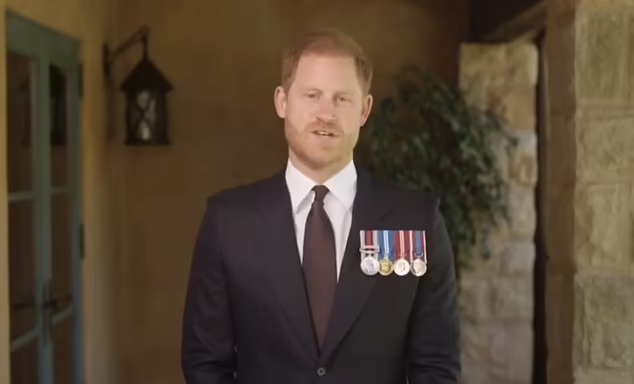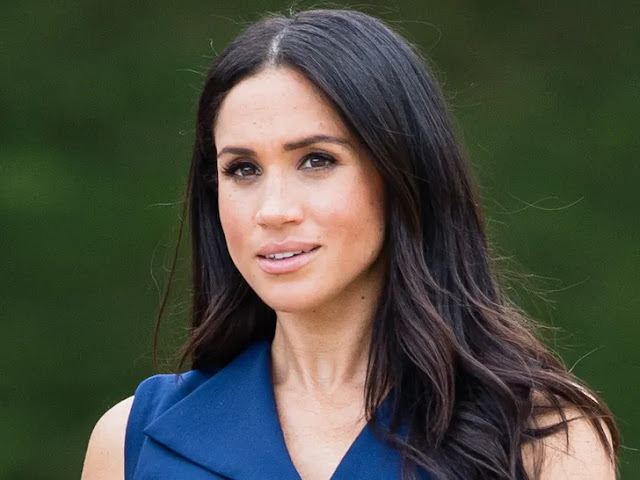Prince Harry faces backlash for 'embarrassing' and 'ridiculous' decision to wear UK 'participation' medals to present US army award
Prince Harry's choice to wear UK military medals while presenting an award to an American soldier has indeed sparked criticism. Some observers on social media have labeled the medals as "participation medals" and questioned why Harry was chosen for the task instead of an American veteran. This criticism highlights differing opinions on whether it was appropriate for Harry, a member of the British royal family, to wear these medals during the ceremony honoring an American soldier.
 |
Prince Harry wore a series of medals to present a US combat medic with a Soldier of the Year Award via video message
While some may see Harry's gesture as a sign of respect for the military and his grandmother's reign, others interpret it as inappropriate or even embarrassing. The absence of the Coronation medal, which was noted by royal observers, adds another layer to the discussion, with some suggesting it may be interpreted as a deliberate choice by Harry to distance himself from his royal heritage.
 |
Harry's medals (left to right) comprised his Afghanistan service medal as well as Golden, Diamond and Platinum Jubilee medals for his grandmother, Queen Elizabeth II
The connection between Prince Harry and Sergeant First Class Elizabeth Marks through the Invictus Games adds depth to the ceremony, highlighting the significance of the event beyond just a traditional military award presentation. It's a reminder of the shared experiences and camaraderie among service members, regardless of nationality.
 |
Four-time Invictus Games gold medalist and five-time Paralympic medalist Sergeant First Class Elizabeth Marks, 33, (pictured) suffered bilateral hip injuries while deployed in Iraq in 2010, after joining up aged just 17
However, criticism of Harry's choice to wear British Army medals persists, with some viewing it as inappropriate or attention-seeking. On the other hand, supporters of Harry argue that his military service, represented by one of the medals, and his familial ties to the late Queen, represented by the jubilee medals, are valid reasons for him to wear them.
 |
The Coronation medal features an effigy of King Charles and Queen Camilla on the front (left) and the royal cypher, CIIIR (Charles III Rex), on the rear
The absence of the Coronation medal has drawn speculation about Harry's intentions and his evolving relationship with his royal heritage, especially as he establishes himself in the United States. This absence, along with his choice to wear the other medals, could be interpreted as a deliberate statement about his identity and future path.
 |
The medals appear to be the same ones he wore to his father King Charles III's coronation in May last year
In essence, the discussion surrounding Prince Harry's attire reflects broader debates about symbolism, identity, and public perception, particularly as he navigates his post-royal life and engages in public events across borders.
The commentary provided by Mr. Fitzwilliams sheds light on the potential significance of Prince Harry's choice regarding the Coronation medal. By not wearing the medal associated with King Charles' ascension to the throne, Harry's actions may indeed be interpreted as a deliberate statement regarding his relationship with the royal family and his future role within it.
 |
Harry also opted not to wear his Coronation medal as he gave a gag-filled monologue at the Stand Up for Heroes event for US veterans last November
The absence of a comment from representatives for the Duke of Sussex adds to the intrigue surrounding the situation, leaving room for speculation and interpretation among the public and royal observers.
The description of the Coronation medal, bearing the effigy of King Charles and Queen Camilla, provides additional context for understanding its symbolism and the potential implications of Harry's decision regarding its display.
Prince Harry's choice to wear his Operational Service medal and his grandmother Queen Elizabeth II's jubilee medals during the ceremony further emphasizes his connection to the military and his family's legacy. These medals serve as tangible reminders of his own service in Afghanistan and his ties to the monarchy.
The heavily stage-managed nature of the event, with Harry delivering a pre-recorded message from his home, reflects the modern reality of public appearances for members of the royal family, especially in light of Harry's transition away from official royal duties.
His tribute to Sergeant First Class Elizabeth Marks underscores the importance of the event and the significance of recognizing the achievements and sacrifices of servicemen and women. Marks' journey, from overcoming injuries sustained in Iraq to becoming a decorated athlete, exemplifies resilience and determination, qualities that Harry highlighted in his speech.



Comments
Post a Comment